 The right to counsel began with a burglary at the Bay Harbor
Poolroom, on the outskirts of Panama City, Florida
The right to counsel began with a burglary at the Bay Harbor
Poolroom, on the outskirts of Panama City, Florida
Date: March 18, 2002 1:30 - 4:00 p.m.
Place: Miami Hyatt Downtown
Who's Invited? Everyone
Celebrate the birth of the constitutional right to counsel
Special Guests:
|
John Hart Ely. Law clerk to Abe Fortas, as he prepared to argue in the U.S. Supreme Court on behalf of Clarence Earl Gideon. Later served as law clerk to Chief Justice Earl Warren and as one of the first federal public defenders. Professor of Constitutional Law at University of Miami School of Law and former Dean of Stanford Law School. | |
|
Bruce Jacob. Florida Assistant Attorney General who briefed and argued the case against Gideon in the U.S Supreme Court. After the decision, he was one of the first to volunteer as a special assistant public defender. Later, as a law professor, he established the Legal Assistance for Inmates Program at the Atlanta Penitentiary and assisted in the establishment of the Harvard Prison Legal Assistance Project. Dean Emeritus and Professor of Criminal Law at Stetson Law School. |
|
Richard Yale Feder. Co-author of the brief amicus curiae, filed on behalf of the Florida American Civil Liberties Union. Retired Circuit Court Judge. |
|
Hugo Black, Jr. Author of Mr. Justice and Mrs. Black, son of the justice who authored the unanimous Gideon decision. |
|
W. Fred Turner. Lawyer appointed to represent Gideon at his retrial, which resulted in an acquittal. Retired Circuit Court Judge. |
|
Bennett Brummer. Public Defender, Eleventh Judicial Circuit of Florida. |
|
Kathleen M. Williams. Federal Public Defender, Southern District of Florida. |
|
Paul M. Rashkind. President, Florida Association of Criminal Defense Lawyers-Miami |
Presented by the Florida Association of Criminal Defense Lawyers-Miami, in conjunction with the Florida Public Defender of the Eleventh Judicial Circuit and the Federal Public Defender, Southern District of Florida. Co-Sponsors: American Bar Association Criminal Justice Section, The Florida Bar, National Association of Criminal Defense Lawyers
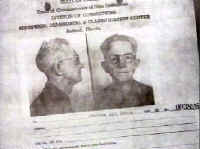 Clarence Earl Gideon, a 50-year- old drifter, was charged with breaking and
entering the pool- room, stealing cash, bottles of soda and wine.
Clarence Earl Gideon, a 50-year- old drifter, was charged with breaking and
entering the pool- room, stealing cash, bottles of soda and wine.
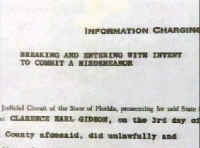 Gideon insisted he was entitled to be represented by a
lawyer. Since he could not afford a lawyer, he wanted a lawyer appointed
for free. He claimed that the U.S. Supreme Court required appointed
counsel for poor persons.
Gideon insisted he was entitled to be represented by a
lawyer. Since he could not afford a lawyer, he wanted a lawyer appointed
for free. He claimed that the U.S. Supreme Court required appointed
counsel for poor persons.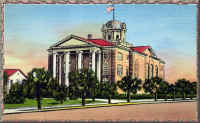 The trial judge
denied Gideon's demand for a court-appointed lawyer, so he represented
himself. The jury convicted him as charged and he was
sentenced to 5 years imprisonment.
The trial judge
denied Gideon's demand for a court-appointed lawyer, so he represented
himself. The jury convicted him as charged and he was
sentenced to 5 years imprisonment.
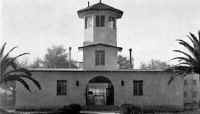 Gideon
served his time at Raiford Prison in
Union County, Florida. The imposing gate and guard tower guarded the
prisoners and the prison's best known facility, the Florida auto
license tag plant.
Gideon
served his time at Raiford Prison in
Union County, Florida. The imposing gate and guard tower guarded the
prisoners and the prison's best known facility, the Florida auto
license tag plant.
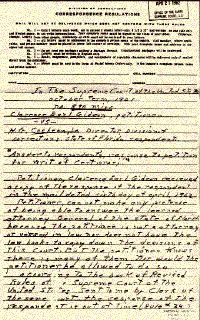 From
his Raiford Prison cell, Gideon handwrote a letter to the U.S. Supreme
Court, asking for a writ of habeas corpus. The Supreme Court ordered a
response by the state of Florida. This is a copy of Gideon's handwritten
answer.
From
his Raiford Prison cell, Gideon handwrote a letter to the U.S. Supreme
Court, asking for a writ of habeas corpus. The Supreme Court ordered a
response by the state of Florida. This is a copy of Gideon's handwritten
answer.
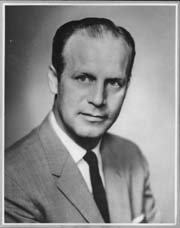 The
respondent to Gideon's petition for writ of habeas corpus was the Director
of the Florida Department of Corrections, H. G.
Cochran, so the case was originally called Gideon
vs. Cochran. That was the name when the
The
respondent to Gideon's petition for writ of habeas corpus was the Director
of the Florida Department of Corrections, H. G.
Cochran, so the case was originally called Gideon
vs. Cochran. That was the name when the
Click the
>
button
to hear Chief Justice Earl Warren
call the case for oral argument on January 15, 1963
Lorem ipsum dolor sit amet, consectetuer adipiscing elit, sed diem nonummy nibh euismod tincidunt ut lacreet dolore magna aliguam erat volutpat.


